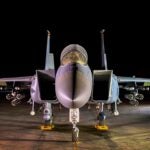
The F-35 Joint Strike Fighter is emerging as a big winner in the fiscal year 2019 defense spending bill, as congressional leaders have included over a dozen additional aircraft over what was authorized in the FY’19 National Defense Authorization Act (NDAA).Appropriators released Sept. 13 the conference report for the H.R. 6157 “minibus” bill, which includes funding for defense, education, labor, and health and human services. Included is about $674 billion for the Department of Defense (DoD); of that about $9.4…

 By
By 











